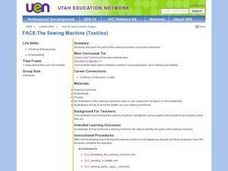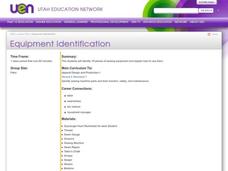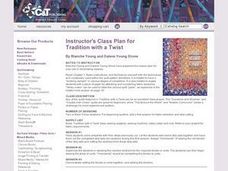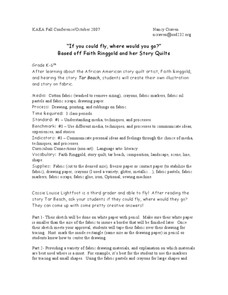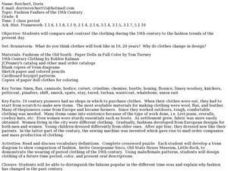Curated OER
Sewing Unit (Textiles)
Get out that sewing machine it's time for a textile project. The class learns how to use a sewing machine, read a pattern, and create a simple article of clothing. They identify the sewing machine parts, use an iron, and think about...
University of Florida
Clothing Capers: Creativity
No matter the age of your sewing pupils, they will enjoy these activities and projects that develop basic sewing machine use, following patterns, and finally creating a fun project of their own.
Curated OER
The Sewing Machine
Students examine the parts of the sewing machine and how to thread it. They demonstrate basic skills related to clothing and textiles. They assess their employability and discuss careers in clothing construction or crafts.
Curated OER
Vocational: Basic Sewing
Young scholars discover how to use sewing machines, ironing boards, and steam irons. Using diagrams, they label all the parts of a sewing machine and solve crossword puzzles in groups. Following a teacher demonstration, students sew...
Curated OER
Sewing Machine Parts
Students examine and identify the various parts of the sewing machines. As a class, they watch a demonstration by their teacher to discover how the machine operates. To end the lesson, they review how to operate the machine safely.
Curated OER
Threading the Sewing Machine
Learners identify the different parts of the sewing machine and their function. After watching a demonstration, they practice threading the machine, winding the bobbin and putting the bobbin in its correct place in the case. To end the...
Curated OER
Equipment Identification
Students are introduced to the various parts of the sewing machine and their function. In groups, they work together to explain how to use each part. To end the lesson, they review safety procedures for the sewing machine and begin to...
Curated OER
Inventor's Workshop
Students explore the six simple machines that are the basis for all mechanical devices. In this physics lesson, students choose one simple machine to research and then find a complex machine it is apart of. Students examine Leonardo...
Curated OER
Pressing and Seam Finishes
This lesson addresses proper seam allowances, how those seams should be finished, and the importance of pressing them. Class members learn by listening as well as by practicing and creating their own samples. There are many attachments...
Curated OER
SIMPLE FABRIC FOLDING FOR HALLOWEEN
Study the fabric folding techniques introduced and lead your class in applying them to quiltmaking, home decorating, fashion design, and other sewing projects. This lesson is geared to making items themed for halloween, but could be...
Virginia Department of Education
Cell Parts
What do a bird, an egg, a rabbit, and a toad all have in common? This fun-filled resource explains the similarities and differences between cells and how all cells are similar, yet all are different. Learners begin by depicting a...
Curated OER
TRADITION WITH A TWIST
Students come prepared with their strips previously cut and sew some strip sets together and have them cut the completed strip sets into sections. They stack the needed sctions for the required blocks of units and set all units together.
Curated OER
Guild Hall
Incorporate a research project into your study of Shakespeare and the Renaissance Period. Class members assume the role of an apprentice seeking membership in one of the various guilds that existed during the Renaissance period. After...
Curated OER
A Sample of What?
Students are introduced to the connection between women and the textile industry. Using primary source documents, they complete a handout on how gender roles have changed over the years. They examine a sampler which is connected to the...
Curated OER
If You Could Fly, Where Would You Go?
Young scholars explore story quilts. In this cross curriculum literacy and art lesson, students listen to the story Tar Beachand discuss the art form of story quilts as used by Faith Ringgold. Young scholars sketch their own "Where Would...
Curated OER
Fashion Fanfare of the 19th Century
Fourth graders compare and contrast the clothing during the 19th century to the fashion trends of the present day. They design something suitable for a future time period and explain why.
Curated OER
Block Magic and Block Magic, Too!
Students are shown how to make fast, fun pictorial blocks using only easy rotary-cut square and rectangles. They do not use any paper piecing or applique' required. Students review "How to Read the Charts". Then the teacher...




